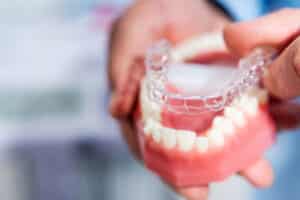Invisalign and Allergies: Are You Sensitive to Aligner Materials?
Can Invisalign Cause Allergic Reactions?

Reactions often appear within days or weeks of wearing the first set of aligners. Some symptoms may fade with time, but others persist, requiring adjustments to treatment.
Signs of Sensitivity or Allergy to Invisalign
People with sensitivity to aligner materials may experience:
- Red or inflamed gums
- Itchy or burning sensation inside the mouth
- Swelling of the lips, tongue, or gums
- Sore throat or difficulty swallowing
- Dry mouth or excessive saliva
- Skin rash around the mouth
- Headaches or dizziness
Most reactions remain mild, but severe swelling or pain should always be taken seriously. Any reaction affecting breathing requires immediate medical attention.
What Causes Sensitivity to Invisalign?
Several factors can trigger irritation or allergic reactions. Identifying the cause helps determine the best way to manage symptoms while continuing treatment.
Reaction to Plastic Material
SmartTrack plastic is hypoallergenic, but some people still react to synthetic materials. The body may see the aligner as a foreign object, leading to inflammation. Those with known plastic allergies should consult a dentist before starting treatment.
Residue from Cleaning Products
Cleaning Invisalign aligners with strong chemicals can leave residues that irritate the mouth. Some people react to solutions with fragrances or alcohol. Using a gentle cleaner designed for aligners helps reduce irritation.
Pre-Existing Allergies
People allergic to acrylics, latex, or other dental materials may experience a reaction to Invisalign. Even though Invisalign does not contain these substances, sensitivity to plastics or adhesives can still cause issues. A history of reactions to retainers or dentures increases the risk.
Bacteria and Poor Hygiene
Bacteria build up quickly inside aligners, especially when worn for long hours. Without proper cleaning, this bacteria can cause irritation that mimics an allergic reaction. Maintaining clean aligners and good oral hygiene reduces inflammation and discomfort.
How to Reduce the Risk of Allergic Reactions
People concerned about sensitivity can take simple steps to reduce irritation. These precautions make treatment more comfortable and help prevent unwanted reactions.
Use Gentle Cleaning Products
Harsh chemicals can irritate. Invisalign cleaning crystals, mild soap, or denture cleaners are the best options. Avoid mouthwash with alcohol, bleach, or potent antibacterial agents.
Rinse Aligners Before Each Use
Washing aligners with warm water before wearing them removes any leftover residue. This step helps reduce irritation caused by cleaning products or dust.
Practice Good Oral Hygiene
Brushing and flossing before inserting aligners prevents bacteria buildup. This habit reduces the risk of irritation caused by trapped food or plaque.
Try a Material Sensitivity Test
People with plastic allergies can request a sample of SmartTrack material from their dentist. Holding the material in the mouth for a few minutes or placing it against the skin can help determine if a reaction occurs.
Switch to a Different Orthodontic Treatment
If symptoms persist, another type of aligner or traditional braces may work better. Some brands offer BPA-free or alternative plastic options for people with sensitivities.
How to Tell if It’s an Allergy or an Adjustment Period
Some irritation occurs naturally when starting Invisalign. Teeth shift into new positions, which can cause temporary discomfort. The gums may feel tender as they adjust to the aligners.
An allergy causes more than just soreness. It usually involves itching, swelling, or a burning sensation. Reactions also tend to appear on soft tissues like the tongue, lips, or cheeks.
If irritation disappears after a few days, it was likely an adjustment issue. If symptoms worsen or persist, a sensitivity or allergy may be the cause.
When to See a Dentist
Mild discomfort often fades within the first week. Severe reactions or symptoms lasting longer than a few weeks require a dental visit.
Signs that require immediate attention include:
- Difficulty breathing or swallowing
- Severe swelling of the lips, tongue, or throat
- Intense burning inside the mouth
- Hives or rashes on the face or neck
- Dizziness or nausea
A dentist can help determine if Invisalign is causing the reaction or if another issue exists. Some people may need a different material or a modified treatment plan.
Other Orthodontic Options for People with Sensitivities

Clear Aligners from Other Brands
Some aligner brands use different plastic formulas. People who react SmartTrack may be able to tolerate another type of aligner. Companies like ClearCorrect and SureSmile offer alternative materials.
Ceramic Braces
Ceramic braces work like traditional metal braces but use clear or tooth-colored brackets. They contain no plastic, making them a good option for people with sensitivity to aligners.
Lingual Braces
These braces attach to the back of the teeth, making them less visible. They use metal brackets and wires, reducing the risk of plastic-related reactions.
Traditional Metal Braces
Metal braces remain a reliable choice for straightening teeth. They do not require plastic aligners, eliminating the risk of reactions to Invisalign materials.
Final Thoughts
Invisalign remains a safe and effective option for most people, but some experience sensitivity to the materials. Identifying symptoms early and taking precautions can help prevent discomfort. People with known allergies to plastics or dental materials should consult a dentist before starting treatment. If irritation persists, exploring other orthodontic options may be the best course of action.
Brighten Your Smile with Confidence
Achieving a whiter smile is possible, even for those with sensitive teeth. Our dental professionals are committed to providing gentle and effective whitening solutions that prioritise your comfort. With personalised care and the latest techniques, we ensure a positive experience without sensitivity.
Explore our services to learn more, or schedule an appointment with our team today.


